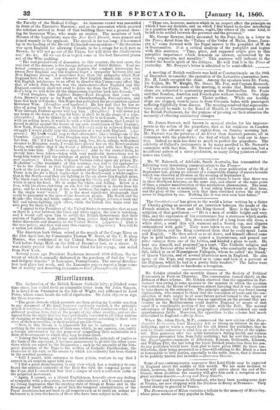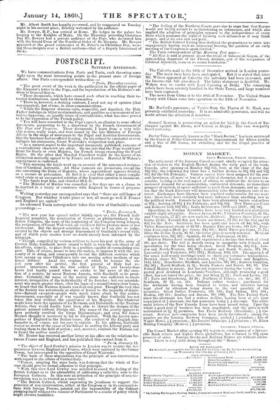311urrlInttrnits.
The declaration of the British Roman Catholic laity, published some time since, has called forth an admirable letter from Sir John Simeon. It is dated from Swainston in the Isle of Wight, and addressed to Lord Petre, whose name heads the roll of signitaries. Sir John objects to sign for these reasons- " The great obstacle which prevents me from giving my humble sanction to any document of the kind, however cautiously worded, is the principle which it involves,—that the inhabitants of the Papal dominions stand in a different position from that of the people of any other country, and are de- barred from the right that has been practically conceded to all other nations of changing or modifying their form of Government according to their own view of their necessities, or their political predilections. "Now, to this theory it is impossible for me to subscribe. I can see nothing in the circumstances of their case which, in my opinion, can justify a foreign intervention for the purpose of compelling their submission to a form of Government to which they may be disinclined. "Taking this broad, and to my mind indefeasible, principle of justice as the basis of the argument, it becomes unnecessary to go into the other ques- tions which are raised by the Declaration ; such as the necessity of the tem- poral dominion of the Pope to the welfare of Catholic Christendom, the character of his rule, or the means by which his authority has been shaken in the revolted provinces. " Still I would, with reference to these points, venture to say that I cannot in all respects agree with you. "I feel a great disinclination to any view which has a tendency to con- found the spiritual authority of the Rely See with the temporal power of the Pope, and I cannot but fear that a danger of such a confusion lurks in the projected movement.
" Again, I cannot, as a liberal Englishman, honestly avow any feeling of sympathy with a despotism, however administered ; and I cannot conceal any strong impression that the existing state of things at Rome and in the Romagna of itself affords a proof that the temporal administration of the Papal dominions has not been in all respects such as to instil an ardent at- tachment to it into the hearts of those who have been subject to its rule.
"These are, however, matters which in no, respect affect the principle on which I base my decision, and on which I feel bound to decline interfering in a question which, in my opinion, ought, like others of the same kind, to be left to be settled between the governor and the governed.
Mr. George Bowyer' lately decorated by the Pope, has, in a letter to the Times, dated from the "Palace of the Order of Malta, Rome, Janu- ar' 4," come forward with the Papal answer to the pamphlet of M. de la Gueronniere. It is a critical analysis of the pamphlet and begins with this sentence. "Time, place, and supposed origin give to this pamphlet importance which demands an answer, undeserved by its views, arguments, and morality." This sentence will indicate to the reader the hostile spirit of the critique. He will find it in the Times of yesterday. Mr. Bowyer's letter is admitted to be semi-official. _
A meeting of British residents was held at Constantinople on the 29th of December to consider the operation of the Levantine quarantine laws. Mr. H. Lamb occupied the chair. Among the speakers were Dr. Foote, Dr. Cullen, Mr. W. Knight, Mr. Grace Mr. Fry, and Captain Kennoch. From the statements made at the meeting, it seems that British vessels alone are subjected to quarantine passing the Dardanelles. Dr. Foote said that Russian, Austrian and French pass without trouble. Our ships suffer annoyance and expense. Theirs neither. While our healthy ships are stopped, vessels came in from Circassia laden with passengers suffering frightfully from disease. The meeting resolved that representa- tions should be made to the Board of Health at Constantinople and tes the British Parliament, for the purpose of pressing on their attention the necessity of effecting satisfactory changes.
Mr. James Stewart, well known in musical circles for his improve- ments in the action of the pianoforte, died at his residence in Camden Town, at the advanced age of eighty-four, on Sunday morning last. Mr. Stewart was the patentee of no fewer than fourteen patents, all in connexion with the pianoforte ; the first of which he took out in Ame- rica. Indeed no man has done so much to perfect the pianoforte. The celebrity of Collard's instruments is by many ascribed to Mr. Stewart's connexion with that firm. Mr. Stewart was not only a musician but a munificent patron of a sister profession, as many living painters Of emi- nence can testify.
Mr. W. Bakewell, of Adelaide, South Australia, has transmitted the following very interesting communication to the Times- " I have read the letter signed R. C.,' in your publication of the 3d of September last, giving an account of a remarkable display of aurora borealis which was observed at Preston on the evening of September 2. "It may interest your correspondent and others to know that there was in these Southern heavens, on the same day, and almost at the same point of time, a similar manifestation of this mysterious phenomenon. The most striking display was at midnight. I was riding homewards at that hour, and the glory of the crimson arch that then stretched across the sky can never be forgotten by me. Nothing like it was ever seen here before."
The Constitutionnel has given to the world a letter written by a Sister of Charity giving an account of an interview between the heads of the French mission to Siam and the King thereof. Here is the lady's de- scription of that gentleman :—" .He is a man of middle height and very thin, and the expression of his countenance has a sternness which marks the absolute sovereign. His dress consisted of a long loose silk dress, a white shirt, a small thin silk ,waiscoat and a Scotch cap, and slippers embroidered with gold." They were taken to see the Queen and the royal children, and the King convinced them that he could speak Latin and English. "He then asked us to sit down, and himself offered some figs in gold baskets ; and next opened a liqueur-ease, and poured out some euracoa from one of the bottles, and handed a glass to each. He kept one himself, and proposed:as a toast, The Catholic religion and Jesus, the Saviour of the world.' The King, who constantly spoke Eng- lish, talked to us of Monseigneur Pallegoin, whom he called ray friend,' of Queen Victoria, and of several illustrious men in England. He also spoke of the Pope, and requested us to come and look at a portrait of his Holiness, which he had in a pretty little boudoir." The ladies were naturally pleased with so handsome a reception.
Mr. Cobden attended the monthly dinner of the Society of Political Economists in Paris on Thursday. The conversation turned chiefly on the i
Isthmus of Suez scheme. Mr. Cobden observed that the opposition n Par- liament was owing in some measure to the manner in which the question was introdced, the House of Commons almost fancying that it was expected to take shares in the enterprise. The principle opposition was found among diplomatists, who seemed to think that the concession of lands and the con- struction of forts might be at some future period turned to the injury of English interests ; but that there was no opposition on the ground that any country on the Mediterianean could deprive England by means of that canal of a considerable portion of her trade with the East. The natural advantages of England and her geographical situation rendered any such apprehensions futile. Moreover, the opposition to the scheme had much diminished in England.—.Daily News.
When Mr. Adam Black, M.P., commenced the new edition of his Ency- clopedia .Britannica, Lord Macaulay felt so strong an interest in the un- dertaking, and so warm a regard for his old friend the publisher, that he said he would endeavour to send him an article for each letter of the alpha- bet. This generous offer the noble historian's failing health and various avocations prevented him from fully realizing ; but he sent five articles to the Encydoptedia—memoirs of Atterbury, Bunyan, Goldsmith, Johnson, and William Pitt, the last being the latest finished production from his pen. As any publisher would have been glad to have given 1000/. for these con- tributions, their being presented as a free-will offering to Mr. Black is a fact so honourable to both parties, especially to the noble donor, that it deserves to be publicly known and recorded.—Inverness Courier.
Some of our contemporaries announce that Lord Clyde may be expected in England about the middle of this month. We are more inclined to think, however, that the gallant General will arrive about the end of Fe- bruary, when doubtless the country will give him such a reception as his great services deserve.--eetruzy and Navy Gazette.
The Count and Countess de Chambord, who have been passing some days at Vienna, are now stopping with the Duchess de Berry at Brunnsee. They intend shortly to proceed to Venice.
The Perseverance of Milan contains a tribute to the memory of Macaulay, whose prose works are very popular in Italy,
Mr. Albert Smith has happily recovered, and he reappeared on Tuesday night in his ancient place, heartily welcomed by his audience.
Mr. Bowyer, M.P., has arrived at Rome. He lodges in the palace be- longing to the Knights of Malta. On the Thursday preceding Christmas Day Mr. Bowyer had a private audience of the Pope, who decorated him with the Grand Cross of the Pontifical Order of St. Gregory. Mr. Bowyer appeared at the grand ceremonies at St. Peter's on Christmas Day, wear- ing these insignia over a British uniform—that of a Deputy Lieutenant of Berks.



























 Previous page
Previous page